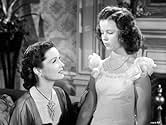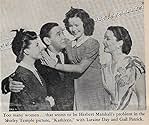Shirley Temple plays Kathleen, a 12-year-old with a rich imagination who lives with her emotionally absent father, a household of servants, and a governess who is a cross between the worst prison guard and Miss Gulch from "The Wizard of Oz". When Kathleen lashes out in rebellion, a doctor is called in to diagnose the girl. This film starts as a drama, but it does not remain all darkness and demons.
All child actors must eventually face uncertainty when they outgrow the young roles that made them successful. Shirley Temple was beyond successful as a child actress, capturing the hearts of moviegoers for years. When she became too old for the "Good Ship Lollipop", would she be able to transition successfully into teen roles and adult roles?
In 'Kathleen", Shirley is 13 years old. The drama of this film is similar to dramatic scenes she had previously played as a child, but viewers expect more from older performers. In "Kathleen" she portrays angst and outrage, but her performance is too childlike, which impacts the early scenes especially. In a few years, she would be better equipped to emote with greater depth. In 1947's "That Hagen Girl", for example, she adeptly portrays a troubled teen beset with a haunting past who is the target of an entire town. 1949's "A Kiss for Corliss" (A comedy with David Niven) is effectively the end of her film career, so she used her newfound skills only sparingly.
Watch for Laraine Day and Gail Patrick, who face off over Kathleen's well-being and the girl's father, played by Herbert Marshall. All of them acquit themselves well. Day, remarkably, is only 8 years old than Shirley, but convincingly plays a professional woman who possesses authority and confidence.
One final note: this film was released soon after the attack on Pearl Harbor. I can only wonder what effect that had on attendance and the public's willingness to be entertained. The nation was in shock and dealing with important matters that completely altered its way of life. A determined response to aggression, and fears about worldwide aggression, were paramount. Still, the nation would learn to use cinema to channel its patriotic fervor and, conversely, to escape harsh realities.
















